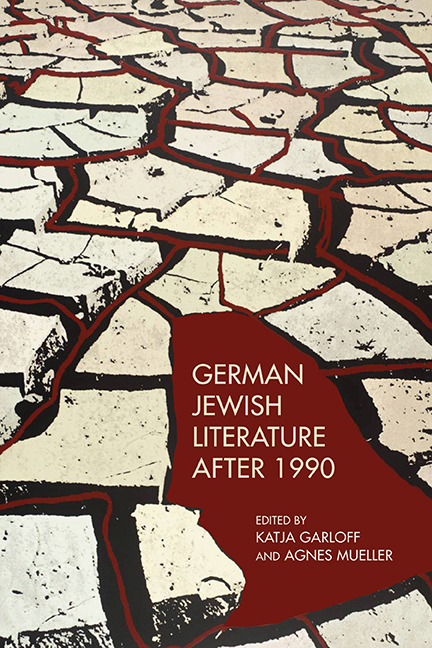Book contents
- Frontmatter
- Contents
- Acknowledgments
- Introduction
- I Self-Reflection in First- and Second-Generation Authors
- II Multiple Identities and Diversification of Holocaust Memory
- 4 The German Jewish Migrant Novel after 1990: Politics of Memory and Multidirectional Writing
- 5 Beyond Negative Symbiosis: The Displacement of Holocaust Trauma and Memory in Alina Bronksy's Scherbenpark and Olga Grjasnowa's Der Russe ist einer, der Birken liebt
- 6 Memory without Borders? Migrant Identity and the Legacy of the Holocaust in Olga Grjasnowa's Der Russe ist einer, der Birken liebt
- 7 Multilingualism and Jewishness in Katja Petrowskaja's Vielleicht Esther
- III New Themes and Directions in Recent German Jewish Literature
- IV Coda: Interviews with Two Contemporary German Jewish Writers
- Bibliography
- Notes on the Contributors
- Index
4 - The German Jewish Migrant Novel after 1990: Politics of Memory and Multidirectional Writing
from II - Multiple Identities and Diversification of Holocaust Memory
Published online by Cambridge University Press: 07 September 2018
- Frontmatter
- Contents
- Acknowledgments
- Introduction
- I Self-Reflection in First- and Second-Generation Authors
- II Multiple Identities and Diversification of Holocaust Memory
- 4 The German Jewish Migrant Novel after 1990: Politics of Memory and Multidirectional Writing
- 5 Beyond Negative Symbiosis: The Displacement of Holocaust Trauma and Memory in Alina Bronksy's Scherbenpark and Olga Grjasnowa's Der Russe ist einer, der Birken liebt
- 6 Memory without Borders? Migrant Identity and the Legacy of the Holocaust in Olga Grjasnowa's Der Russe ist einer, der Birken liebt
- 7 Multilingualism and Jewishness in Katja Petrowskaja's Vielleicht Esther
- III New Themes and Directions in Recent German Jewish Literature
- IV Coda: Interviews with Two Contemporary German Jewish Writers
- Bibliography
- Notes on the Contributors
- Index
Summary
THIS ESSAY INVESTIGATES the interrelations and frictions between different recollections of the European past in contemporary German Jewish migrant literature as these remembrances relate to the EU's memory politics. I suggest that Jewish authors who have migrated from formerly Soviet areas to western parts of Europe carry memories across the mnemonic borderline between East and West and thus undermine the current memory contest between what Claus Leggewie considers to be the two main traumas of Europe: the Holocaust and the Gulag.
From 1980 onwards, the EU increasingly turned its attention towards the Holocaust as a shared reference point of Europe's traumatic past. The Nazi genocide came to function as a master narrative that was supposed to negatively underpin the redemptive effects of European integration. Nevertheless, the political changes of 1989 led to wave of belated commemoration of Stalinist and Communist suppression in the post-Soviet countries—a wave that challenged the hegemony of the Holocaust narrative and called for more attention to the history of Soviet domination and the Gulag. From the perspective of the newly liberated countries entering the European Union from 2004 onwards, the massive attention given to the Holocaust in European history writing marginalizes their suffering. Contesting the “Auschwitz paradigm” that obliges them to acknowledge the Holocaust as the absolute “‘Other’ of European values,” the new Eastern European member states of the EU promote “an interpretation of the history of Central and Eastern Europe based on the equivalence of the two ‘totalitarianisms,’ Stalinism and Nazism.” The dissolution of the political and ideological division between Eastern and Western Europe thus failed to abolish the mnemonic division that had been inaugurated by the different political and ideological developments after 1945. “At a time with disappearing customs barriers and single currencies, the frontiers of memory stay solidly in place,” Tony Judt concluded.
My essay will trace the process of universalizing Holocaust memory, which inaugurated the current memory contest between the old and the new member-states of the European Union. I show how writings by Barbara Honigmann and Vladimir Vertlib escape existing memory constructions and restructure European memories of the Holocaust and the Gulag.
- Type
- Chapter
- Information
- German Jewish Literature after 1990 , pp. 83 - 101Publisher: Boydell & BrewerPrint publication year: 2018

